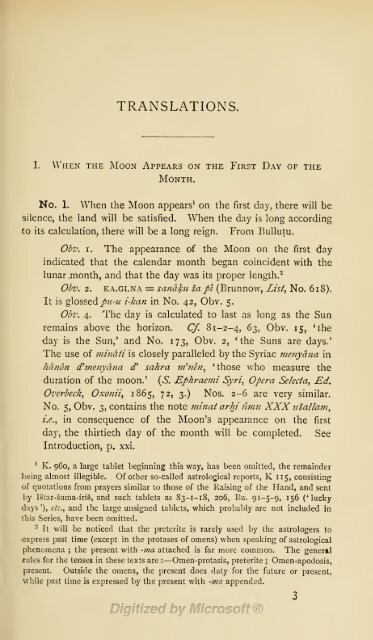volume 2
volume 2
volume 2
You also want an ePaper? Increase the reach of your titles
YUMPU automatically turns print PDFs into web optimized ePapers that Google loves.
TRANSLATIONS.<br />
I. When the Moon Appears on the First Day of the<br />
Month.<br />
No. 1. When the Moon appears' on the first day, there will be<br />
silence, the land will be satisfied. When the day is long according<br />
to its calculation, there will be a long reign. From BuUutu.<br />
Obv. I. The appearance of the Moon on the first day<br />
indicated that the calendar month began coincident with the<br />
lunar month, and that the day was its proper length.^<br />
Obv. 2. KA.Gi.NA = satidku sa pi (Brunnow, List, No. 6i8).<br />
It is glossed /?/-z^ i-kan in No. 42, Obv. 5.<br />
Obv. 4. The day is calculated to last as long<br />
as the Sun<br />
remains above the horizon. Cf. 81-2-4, 63, Obv. 15, 'the<br />
day is the Sun,' and No. 173, Obv. 2, 'the Suns are days.'<br />
The use of i?nnati is closely paralleled by the Syriac menyana in<br />
hihion d'me?iydna d' sahra m^nen, 'those who measure the<br />
duration of the moon.' (6". Ephraemi Syri, Opera Selecta, Ed.<br />
Overbeck, Oxotiii, 1865, 72, 3.) Nos. 2-6 are very similar.<br />
No. 5, Obv. 3, contains the note ininat arhi jlmii XXX usallavi,<br />
i.e., in consequence of the Moon's appearance on the first<br />
day, the thirtieth day of the month will be completed. See<br />
Introduction, p. xxi.<br />
' K, 960, a large tablet beginning this way, has been omitted, the remainder<br />
teing almost illegible. Of other so-called astrological reports, K 115, consisting<br />
of quotations from prayers similar to those of the Raising of the Hand, and sent<br />
by IStar-suma-in's, and such tablets as 83-1-18, 206, Bu. 91-5-9, 156 ('lucky<br />
days '), etc., and the large unsigned tablets, which probably are not included in<br />
fhis Series, have been omitted.<br />
- It will be noticed that the preterite is rarely used by the astrologers to<br />
•express past time (except in the protases of omens) when speaking of astrological<br />
phenomena ; the present with -ma attached is far more common. The general<br />
rules for the tenses in these texts are :— Omen-protasis, preterite ; Omen-apodosis,<br />
present. Outside the omens, the present does duty for the future or present,<br />
while past time is expressed by the present with -ma appended.<br />
3

















